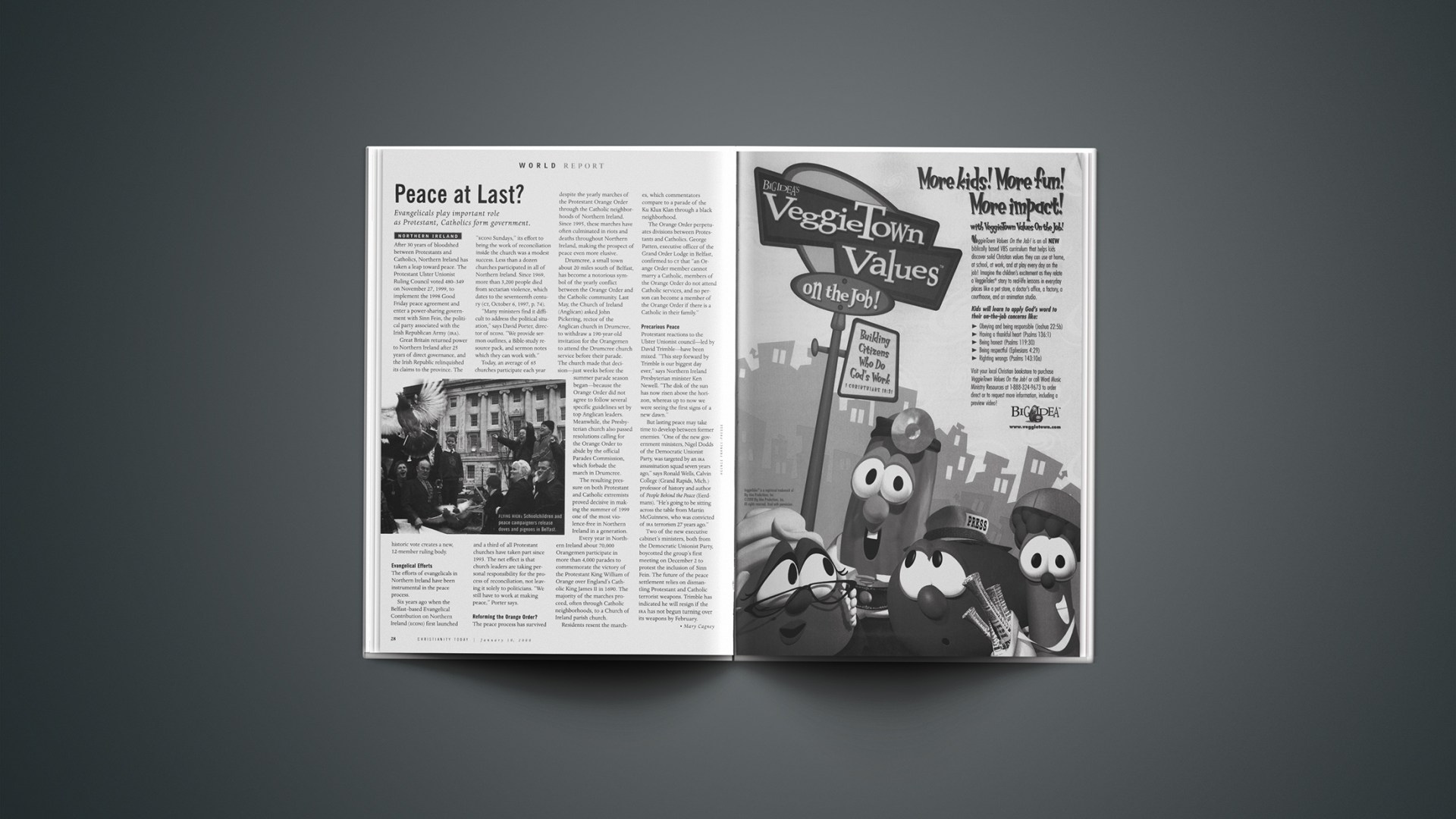After 30 years of bloodshed between Protestants and Catholics, Northern Ireland has taken a leap toward peace. The Protestant Ulster Unionist Ruling Council voted 480-349 on November 27, 1999, to implement the 1998 Good Friday peace agreement and enter a power-sharing government with Sinn Fein, the political party associated with the Irish Republican Army (IRA).
Great Britain returned power to Northern Ireland after 25 years of direct governance, and the Irish Republic relinquished its claims to the province. The historic vote creates a new, 10-member ruling body.
Evangelical Efforts
The efforts of evangelicals in Northern Ireland have been instrumental in the peace process.
Six years ago when the Belfast-based Evangelical Contribution on Northern Ireland (ECONI) first launched "ECONI Sundays," its effort to bring the work of reconciliation inside the church was a modest success. Less than a dozen churches participated in all of Northern Ireland. Since 1969, more than 3,200 people died from sectarian violence, which dates to the seventeenth century.
"Many ministers find it difficult to address the political situation," says David Porter, director of ECONI. "We provide sermon outlines, a Bible-study resource pack, and sermon notes which they can work with."
Today, an average of 65 churches participate each year and a third of all Protestant churches have taken part since 1993. The net effect is that church leaders are taking personal responsibility for the process of reconciliation, not leaving it solely to politicians. "We still have to work at making peace," Porter says.
Reforming The Orange Order?
The peace process has survived despite the yearly marches of the Protestant Orange Order through the Catholic neighborhoods of Northern Ireland. Since 1995, these marches have often culminated in riots and deaths throughout Northern Ireland, making the prospect of peace even more elusive.
Drumcree, a small town about 20 miles south of Belfast, has become a notorious symbol of the yearly conflict between the Orange Order and the Catholic community. Last May, the Church of Ireland (Anglican) asked John Pickering, rector of the Anglican church in Drumcree, to withdraw a 190-year-old invitation for the Orangemen to attend the Drumcree church service before their parade. The church made that decision—just weeks before the summer parade season began—because the Orange Order did not agree to follow several specific guidelines set by top Anglican leaders. Meanwhile, the Presbyterian church also passed resolutions calling for the Orange Order to abide by the official Parades Commission, which forbade the march in Drumcree.
The resulting pressure on both Protestant and Catholic extremists proved decisive in making the summer of 1999 one of the most violence-free in Northern Ireland in a generation.
Every year in Northern Ireland about 70,000 Orangemen participate in more than 4,000 parades to commemorate the victory of the Protestant King William of Orange over England's Catholic King James II in 1690. The majority of the marches proceed, often through Catholic neighborhoods, to a Church of Ireland parish. Residents resent the marches, which commentators compare to a parade of the Ku Klux Klan through a black neighborhood.
The Orange Order perpetuates divisions between Protestants and Catholics. George Patten, executive officer of the Grand Order Lodge in Belfast, confirmed to CT that "an Orange Order member cannot marry a Catholic, members of the Orange Order do not attend Catholic services, and no person can become a member of the Orange Order if there is a Catholic in their family."
Precarious Peace
Protestant reactions to the Ulster Unionist council—led by David Trimble—have been mixed. "This step forward by Trimble is our biggest day ever," says Northern Ireland Presbyterian minister Ken Newell. "The disk of the sun has now risen above the horizon, whereas up to now we were seeing the first signs of a new dawn."
But lasting peace may take time to develop between former enemies. "One of the new government ministers, Nigel Dodd of the Democratic Unionist Party, was targeted by an IRA assassination squad seven years ago," says Ronald Wells, Calvin College professor of history and author of People Behind the Peace (Eerdmans). "He's going to be sitting across the table from Martin McGuiness, who was convicted of IRA terrorism 27 years ago."
Two of the new executive cabinet's ministers, both from the Democratic Unionist Party, boycotted the group's first meeting on December 2 to protest the inclusion of Sinn Fein. The future of the peace settlement relies on dismantling Protestant and Catholic terrorist weapons. Trimble has indicated he will resign if the IRA has not begun turning over its weapons by February.
Related Elsewhere
See our earlier coverage of the Northern Ireland peace process:
"For God or Ulster? | Northern Ireland takes a 'leap of faith' toward peace." (Oct. 6, 1997)
" 'The Kids Are the Candles' "(Oct. 6, 1997)
"Vote for Peace No Panacea" (July 13, 1998)
"Christian Peace Activists Refocus on Forgiveness" (Dec. 9, 1996)
See more on the Northern Ireland Peace Process at Yahoo's full coverage area, BBC News's excellent in-depth reference area, and the Irish Times.
ECONI's Web site includes information about the organization, its quarterly publication, Lion & Lamb, news, position papers, links, and other such resources.
Copyright © 2000 Christianity Today. Click for reprint information.










